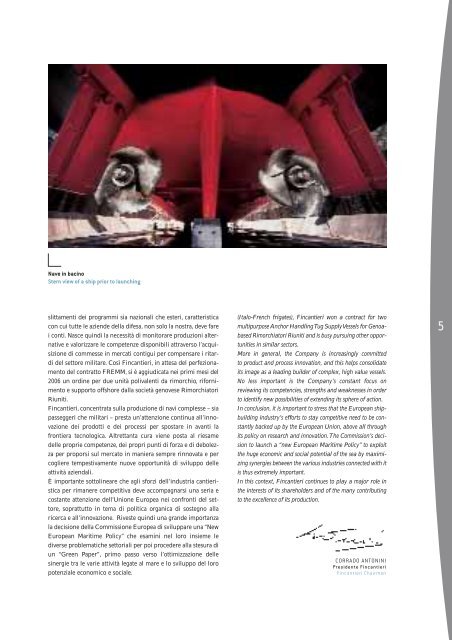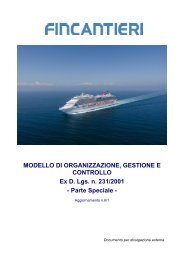La nave da crociera “Crown Princess” - Fincantieri
La nave da crociera “Crown Princess” - Fincantieri
La nave da crociera “Crown Princess” - Fincantieri
You also want an ePaper? Increase the reach of your titles
YUMPU automatically turns print PDFs into web optimized ePapers that Google loves.
Nave in bacino<br />
Stern view of a ship prior to launching<br />
slittamenti dei programmi sia nazionali che esteri, caratteristica<br />
con cui tutte le aziende della difesa, non solo la nostra, deve fare<br />
i conti. Nasce quindi la necessità di monitorare produzioni alternative<br />
e valorizzare le competenze disponibili attraverso l’acquisizione<br />
di commesse in mercati contigui per compensare i ritardi<br />
del settore militare. Così <strong>Fincantieri</strong>, in attesa del perfezionamento<br />
del contratto FREMM, si è aggiudicata nei primi mesi del<br />
2006 un ordine per due unità polivalenti <strong>da</strong> rimorchio, rifornimento<br />
e supporto offshore <strong>da</strong>lla società genovese Rimorchiatori<br />
Riuniti.<br />
<strong>Fincantieri</strong>, concentrata sulla produzione di navi complesse – sia<br />
passeggeri che militari – presta un’attenzione continua all’innovazione<br />
dei prodotti e dei processi per spostare in avanti la<br />
frontiera tecnologica. Altrettanta cura viene posta al riesame<br />
delle proprie competenze, dei propri punti di forza e di debolezza<br />
per proporsi sul mercato in maniera sempre rinnovata e per<br />
cogliere tempestivamente nuove opportunità di sviluppo delle<br />
attività azien<strong>da</strong>li.<br />
È importante sottolineare che agli sforzi dell’industria cantieristica<br />
per rimanere competitiva deve accompagnarsi una seria e<br />
costante attenzione dell’Unione Europea nei confronti del settore,<br />
soprattutto in tema di politica organica di sostegno alla<br />
ricerca e all’innovazione. Riveste quindi una grande importanza<br />
la decisione della Commissione Europea di sviluppare una “New<br />
European Maritime Policy” che esamini nel loro insieme le<br />
diverse problematiche settoriali per poi procedere alla stesura di<br />
un “Green Paper”, primo passo verso l’ottimizzazione delle<br />
sinergie tra le varie attività legate al mare e lo sviluppo del loro<br />
potenziale economico e sociale.<br />
(Italo-French frigates), <strong>Fincantieri</strong> won a contract for two<br />
multipurpose Anchor Handling Tug Supply Vessels for Genoabased<br />
Rimorchiatori Riuniti and is busy pursuing other opportunities<br />
in similar sectors.<br />
More in general, the Company is increasingly committed<br />
to product and process innovation, and this helps consoli<strong>da</strong>te<br />
its image as a leading builder of complex, high value vessels.<br />
No less important is the Company’s constant focus on<br />
reviewing its competencies, strengths and weaknesses in order<br />
to identify new possibilities of extending its sphere of action.<br />
In conclusion, it is important to stress that the European shipbuilding<br />
industry’s efforts to stay competitive need to be constantly<br />
backed up by the European Union, above all through<br />
its policy on research and innovation. The Commission’s decision<br />
to launch a “new European Maritime Policy” to exploit<br />
the huge economic and social potential of the sea by maximizing<br />
synergies between the various industries connected with it<br />
is thus extremely important.<br />
In this context, <strong>Fincantieri</strong> continues to play a major role in<br />
the interests of its shareholders and of the many contributing<br />
to the excellence of its production.<br />
CORRADO ANTONINI<br />
Presidente <strong>Fincantieri</strong><br />
<strong>Fincantieri</strong> Chairman<br />
5



